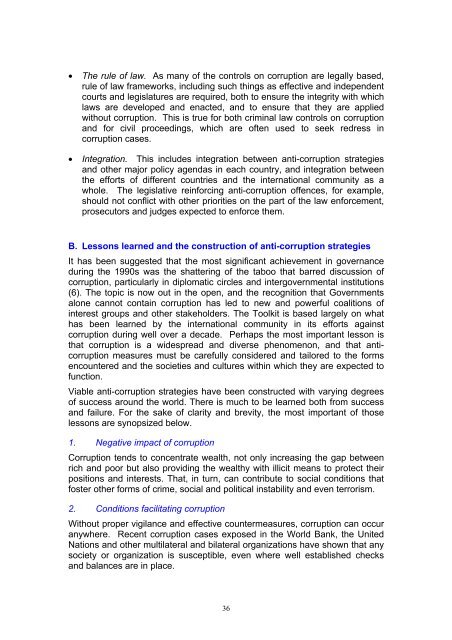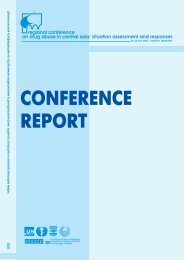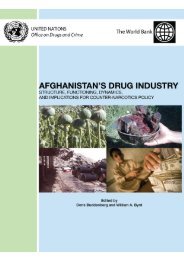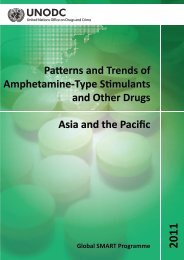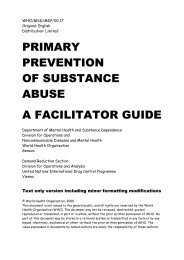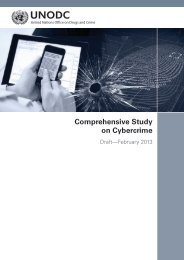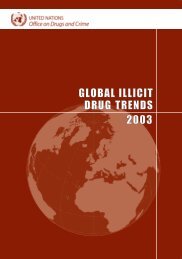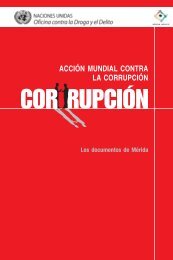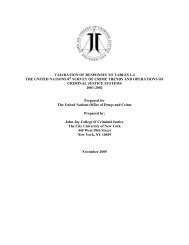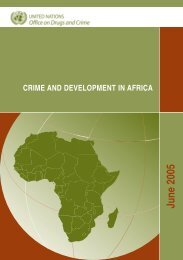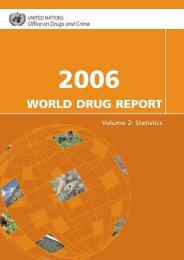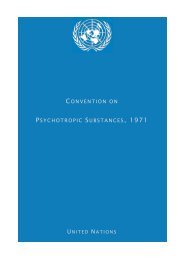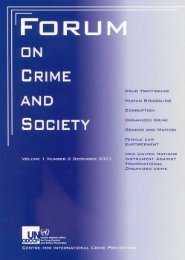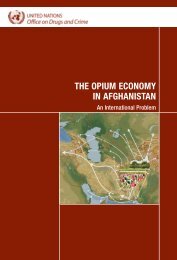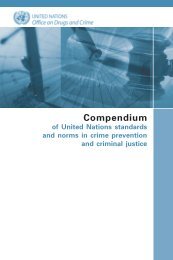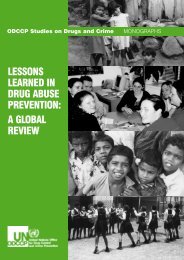UN Guide for Anti-Corruption Policies - United Nations Office on ...
UN Guide for Anti-Corruption Policies - United Nations Office on ...
UN Guide for Anti-Corruption Policies - United Nations Office on ...
Create successful ePaper yourself
Turn your PDF publications into a flip-book with our unique Google optimized e-Paper software.
• The rule of law. As many of the c<strong>on</strong>trols <strong>on</strong> corrupti<strong>on</strong> are legally based,<br />
rule of law frameworks, including such things as effective and independent<br />
courts and legislatures are required, both to ensure the integrity with which<br />
laws are developed and enacted, and to ensure that they are applied<br />
without corrupti<strong>on</strong>. This is true <str<strong>on</strong>g>for</str<strong>on</strong>g> both criminal law c<strong>on</strong>trols <strong>on</strong> corrupti<strong>on</strong><br />
and <str<strong>on</strong>g>for</str<strong>on</strong>g> civil proceedings, which are often used to seek redress in<br />
corrupti<strong>on</strong> cases.<br />
• Integrati<strong>on</strong>. This includes integrati<strong>on</strong> between anti-corrupti<strong>on</strong> strategies<br />
and other major policy agendas in each country, and integrati<strong>on</strong> between<br />
the ef<str<strong>on</strong>g>for</str<strong>on</strong>g>ts of different countries and the internati<strong>on</strong>al community as a<br />
whole. The legislative rein<str<strong>on</strong>g>for</str<strong>on</strong>g>cing anti-corrupti<strong>on</strong> offences, <str<strong>on</strong>g>for</str<strong>on</strong>g> example,<br />
should not c<strong>on</strong>flict with other priorities <strong>on</strong> the part of the law en<str<strong>on</strong>g>for</str<strong>on</strong>g>cement,<br />
prosecutors and judges expected to en<str<strong>on</strong>g>for</str<strong>on</strong>g>ce them.<br />
B. Less<strong>on</strong>s learned and the c<strong>on</strong>structi<strong>on</strong> of anti-corrupti<strong>on</strong> strategies<br />
It has been suggested that the most significant achievement in governance<br />
during the 1990s was the shattering of the taboo that barred discussi<strong>on</strong> of<br />
corrupti<strong>on</strong>, particularly in diplomatic circles and intergovernmental instituti<strong>on</strong>s<br />
(6). The topic is now out in the open, and the recogniti<strong>on</strong> that Governments<br />
al<strong>on</strong>e cannot c<strong>on</strong>tain corrupti<strong>on</strong> has led to new and powerful coaliti<strong>on</strong>s of<br />
interest groups and other stakeholders. The Toolkit is based largely <strong>on</strong> what<br />
has been learned by the internati<strong>on</strong>al community in its ef<str<strong>on</strong>g>for</str<strong>on</strong>g>ts against<br />
corrupti<strong>on</strong> during well over a decade. Perhaps the most important less<strong>on</strong> is<br />
that corrupti<strong>on</strong> is a widespread and diverse phenomen<strong>on</strong>, and that anticorrupti<strong>on</strong><br />
measures must be carefully c<strong>on</strong>sidered and tailored to the <str<strong>on</strong>g>for</str<strong>on</strong>g>ms<br />
encountered and the societies and cultures within which they are expected to<br />
functi<strong>on</strong>.<br />
Viable anti-corrupti<strong>on</strong> strategies have been c<strong>on</strong>structed with varying degrees<br />
of success around the world. There is much to be learned both from success<br />
and failure. For the sake of clarity and brevity, the most important of those<br />
less<strong>on</strong>s are synopsized below.<br />
1. Negative impact of corrupti<strong>on</strong><br />
<str<strong>on</strong>g>Corrupti<strong>on</strong></str<strong>on</strong>g> tends to c<strong>on</strong>centrate wealth, not <strong>on</strong>ly increasing the gap between<br />
rich and poor but also providing the wealthy with illicit means to protect their<br />
positi<strong>on</strong>s and interests. That, in turn, can c<strong>on</strong>tribute to social c<strong>on</strong>diti<strong>on</strong>s that<br />
foster other <str<strong>on</strong>g>for</str<strong>on</strong>g>ms of crime, social and political instability and even terrorism.<br />
2. C<strong>on</strong>diti<strong>on</strong>s facilitating corrupti<strong>on</strong><br />
Without proper vigilance and effective countermeasures, corrupti<strong>on</strong> can occur<br />
anywhere. Recent corrupti<strong>on</strong> cases exposed in the World Bank, the <str<strong>on</strong>g>United</str<strong>on</strong>g><br />
<str<strong>on</strong>g>Nati<strong>on</strong>s</str<strong>on</strong>g> and other multilateral and bilateral organizati<strong>on</strong>s have shown that any<br />
society or organizati<strong>on</strong> is susceptible, even where well established checks<br />
and balances are in place.<br />
36


